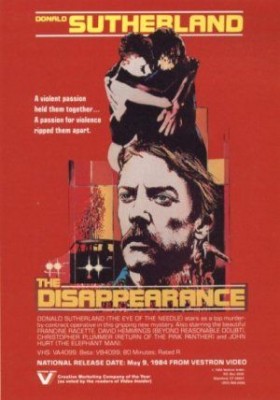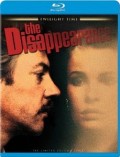| Reviews & Columns |
|
Reviews DVD TV on DVD Blu-ray 4K UHD International DVDs In Theaters Reviews by Studio Video Games Features Collector Series DVDs Easter Egg Database Interviews DVD Talk Radio Feature Articles Columns Anime Talk DVD Savant Horror DVDs The M.O.D. Squad Art House HD Talk Silent DVD
|
DVD Talk Forum |
|
|
| Resources |
|
DVD Price Search Customer Service #'s RCE Info Links |
|
Columns
|
|
|
Disappearance, The
Twilight Time, deviating sharply from past releases of mostly Fox and Columbia catalog titles, is offering the film on Blu-ray in a stunningly beautiful high-def transfer restoring John Alcott's (Stanley Kubrick's DP from 2001 through The Shining) superb cinematography.
Shades of Robin Hardy's The Wicker Man (1973), Cooper's 101-minute cut no longer survives except as a full-frame, standard-def video master, which is included as an extra. The feature that does survive and now in high-definition is a heretofore unknown third cut running 91 minutes. It restores the delicate original score (replaced in the American version by an inane electronic one) and Cooper's non-linear cutting. Cooper himself says he has no idea where this version came from, and that while it's slightly shorter than his original version he nonetheless heartily endorses it as the new "official" version.
The movie is fascinating, carving its own unique take on a familiar genre. It's a hard movie to describe: imagine The Mechanic (1972) remade by Atom Egoyan, while in non-linear fashion it explores a rocky intimate relationship that's like parts of Stanley Donen's Two for the Road and Nicholas Roeg's Don't Look Now (the latter also starring Sutherland).
In addition to the superlative high-def transfer, the disc offers several very worthwhile extras, including a new interview with Cooper.
The film works best seen cold, knowing nothing about it going in, so you might consider reading no further until you've seen it. In the meantime I'll try to reveal as little about it as possible while singing its praises. Jay Mallory (Sutherland) is a hit man working for a mysterious international assassination agency known only as "The Office," with longtime friend Burbank (David Warner) his only direct contact with the company. After one such job Mallory returns to his stylish if austere Montreal apartment (Moshe Safdie's Habitat 67, in fact) to discover that this wife, Celandine (Francine Racette), has vanished. They've been having marital troubles and he assumes she's left him without saying a word.
Burbank turns up with details about his next "shy" (target for assassination), but Mallory is too distraught and presses Burbank to find somebody else for the assignment, at least until he can come to terms with his wife's vanishing. But then Burbank, himself under some duress, reveals that Mallory's last hit (Dan Howard) was actually a fellow assassin deemed unreliable and marked for death. Despite Mallory's reputation as the company's "best man," Burbank is concerned that if Mallory doesn't get to work he might be targeted next. After learning that both the hit and the man Celandine might possibly have left him for are both in England, Mallory finally agrees to take on the job. (All this occurs during the first thirty minutes or so.)
The circumstances leading up to the production of The Disappearance are fascinating. Hoboken-born Stuart Cooper moved to London in 1961 to study acting at the Royal Academy of Dramatic Arts, an underclassman of Anthony Hopkins, David Warner and John Hurt. As an expat actor Cooper landed a role as one of The Dirty Dozen (1967) alongside Canadian Sutherland, who similarly worked hard to establish himself in British and continental films. Once Cooper turned to ambitious directing projects in the seventies, first documentaries then narrative features, his old acting chums were more than willing to join in.
For The Disappearance Cooper originally envisioned Dirty Dozen's Lee Marvin for the lead, and while the veteran actor liked the script, felt that he'd already played that character too many times before, so Cooper next went to Sutherland. Sutherland first turned him down but suggested his wife, Francine Racette, for the part of Celandine. Cooper changed the script slightly to better suit Sutherland's needs, and eventually he accepted the role. Besides old friends Warner and Hurt (who plays Mallory's English contact), the producer of The Disappearance, actor David Hemmings, agreed to play Celandine's ex-husband. The great cast also includes Peter Bowles, Virginia McKenna, Christopher Plummer and, blink and you'll miss her, Patricia Hodge as the woman briefly glimpsed at the site of a road accident.
The John le Carré-esque Mallory doesn't come in from the cold, he wades through it, through the shin-high snow and slosh of deglamorized Montreal, which Alcott's photography makes as bleak as the nearly concurrent Quintet. The movie is deliberately paced and cryptic like a le Carré novel; doubtlessly what prompted the radical American reedit. Pressured into taking the next job in the present, Mallory reflects on past conversations with Celandine, searching for clues about why she left him and where she might have gone. Cooper's direction and Sutherland's excellent performance suggest this outwardly cool assassin inwardly is in a state of total panic.
The film is adapted from a novel by Derek Marlowe, who also wrote what became the dreary film of A Dandy in Aspic (a picture compromised by the death of director Anthony Mann during production) but here the approach is entirely different. More like le Carré, the viewer's patience and attentiveness eventually pays off.
Like Two for the Road, the movie freely shifts around in time, connecting conversations from the past to present-day clues, from Mallory's first meeting with the unhappily married Celandine, ironically a chance meeting during one of Mallory's hits, through personal tragedy and eventually a vaguely resentful co-existence, where after returning home Mallory seems more interested in listening to ball games on the radio than bedding down with his sexy wife. I confess to being a bit confused by her motivations and actions as revealed late in the film, though the pieces of that part of the puzzle probably will make more sense after a second viewing (and I am eager to look at this again soon).
They say when a film has one great performance you can credit the actor but when all the performances are good the director deserves the credit. Cooper's cast is unquestionably peerless, but few have been better than they are in this, and there's uniformity in their performances, a subtlety and a refusing to fall back on genre stereotypes. McKenna has one long scene with Sutherland where everything is expressed indirectly yet clear to the audience, and Plummer is in the film only very briefly, maybe one minute, but each makes a strong impression. Warner is one of this reviewer's all-time favorite character actors, but I don't think I've seen him less than excellent, even in lesser films.
Video & Audio
The Disappearance is a long-lost mini-masterpiece ripe for rediscovery, and Twilight Time's Blu-ray provides it the best possible venue. The 1.85:1 1080p transfer is flawless. If you're a fan of Alcott's cinematography on A Clockwork Orange, Barry Lyndon, and The Shining (and it most resembles the latter) you'll want to rush out and see this. The DTS-HD Master Audio 1.0 mono effectively conveys the delicate sound mix. The disc is region A encoded and limited to 3,000 units.
Extra Features
Supplements include a fascinating if too-short (and spoiler-filled!) interview with Cooper who's charming and forthright about the film's disastrous distribution. His original 101-minute cut is presented as an extra, as it survives: as a full-frame video transfer possibly 30 years old or more. Also included is just enough of an excerpt from the recut, rescored American version (also SD) to get a taste of how wrong-headed that thinking was. As per other Twilight Time releases an isolated score track is offered, along with Julie Kirgo's usual observant liner notes.
Parting Thoughts
Visually stunning, beautifully acted, and refreshingly challenging and adult, The Disappearance is one of the Best Blu-ray releases of 2013 and a DVD Talk Collector Series title.
Stuart Galbraith IV is a Kyoto-based film historian whose work includes film history books, DVD and Blu-ray audio commentaries and special features. Visit Stuart's Cine Blogarama here.
|
| Popular Reviews |
| Sponsored Links |
|
|
| Sponsored Links |
|
|
| Release List | Reviews | Shop | Newsletter | Forum | DVD Giveaways | Blu-Ray | Advertise |
|
Copyright 2024 DVDTalk.com All Rights Reserved. Legal Info, Privacy Policy, Terms of Use,
Manage Preferences,
Your Privacy Choices | |||||||














